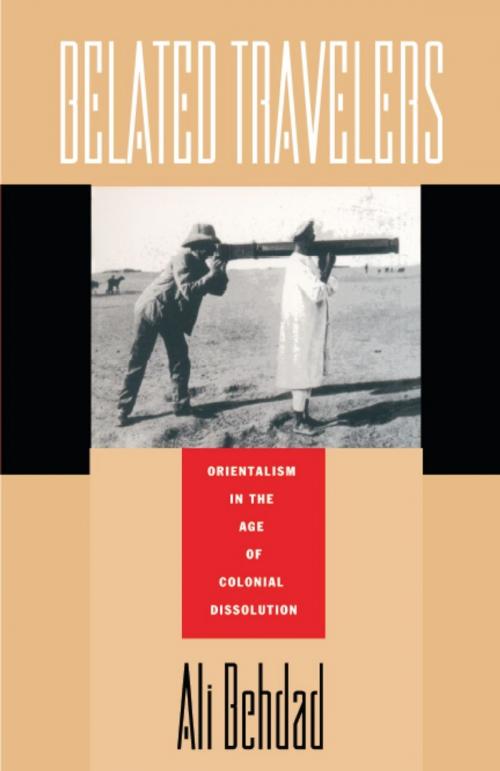| Author: | Ali Behdad, Stanley Fish, Fredric Jameson | ISBN: | 9780822382638 |
| Publisher: | Duke University Press | Publication: | August 12, 1994 |
| Imprint: | Duke University Press Books | Language: | English |
| Author: | Ali Behdad, Stanley Fish, Fredric Jameson |
| ISBN: | 9780822382638 |
| Publisher: | Duke University Press |
| Publication: | August 12, 1994 |
| Imprint: | Duke University Press Books |
| Language: | English |
In Belated Travelers, Ali Behdad offers a compelling cultural critique of nineteenth-century travel writing and its dynamic function in European colonialism. Arriving too late to the Orient, at a time when tourism and colonialism had already turned the exotic into the familiar, late nineteenth-century European travelers to the Middle East experienced a sense of belatedness, of having missed the authentic experience once offered by a world that was already disappearing. Behdad argues that this nostalgic desire for the other contains an implicit critique of Western superiority, a split within European discourses of otherness. Working from these insights and using analyses of power derived from Foucault, Behdad engages in a new critique of orientalism. No longer viewed as a coherent and unified phenomenon or a single developmental tradition, it is seen as a complex and shifting field of practices that has relied upon its own ambivalence and moments of discontinuity to ensure and maintain its power as a discourse of dominance.
Through readings of Flaubert, Nerval, Kipling, Blunt, and Eberhardt, and following the transition in travel literature from travelog to tourist guide, Belated Travelers addresses the specific historical conditions of late nineteenth-century orientalism implicated in the discourses of desire and power. Behdad also views a broad range of issues in addition to nostalgia and tourism, including transvestism and melancholia, to specifically demonstrate the ways in which the heterogeneity of orientalism and the plurality of its practice is an enabling force in the production and transformation of colonial power.
An exceptional work that provides an important critique of issues at the forefront of critical practice today, Belated Travelers will be eagerly awaited by specialists in nineteenth-century British and French literatures, and all concerned with colonial and post-colonial discourse.
In Belated Travelers, Ali Behdad offers a compelling cultural critique of nineteenth-century travel writing and its dynamic function in European colonialism. Arriving too late to the Orient, at a time when tourism and colonialism had already turned the exotic into the familiar, late nineteenth-century European travelers to the Middle East experienced a sense of belatedness, of having missed the authentic experience once offered by a world that was already disappearing. Behdad argues that this nostalgic desire for the other contains an implicit critique of Western superiority, a split within European discourses of otherness. Working from these insights and using analyses of power derived from Foucault, Behdad engages in a new critique of orientalism. No longer viewed as a coherent and unified phenomenon or a single developmental tradition, it is seen as a complex and shifting field of practices that has relied upon its own ambivalence and moments of discontinuity to ensure and maintain its power as a discourse of dominance.
Through readings of Flaubert, Nerval, Kipling, Blunt, and Eberhardt, and following the transition in travel literature from travelog to tourist guide, Belated Travelers addresses the specific historical conditions of late nineteenth-century orientalism implicated in the discourses of desire and power. Behdad also views a broad range of issues in addition to nostalgia and tourism, including transvestism and melancholia, to specifically demonstrate the ways in which the heterogeneity of orientalism and the plurality of its practice is an enabling force in the production and transformation of colonial power.
An exceptional work that provides an important critique of issues at the forefront of critical practice today, Belated Travelers will be eagerly awaited by specialists in nineteenth-century British and French literatures, and all concerned with colonial and post-colonial discourse.















